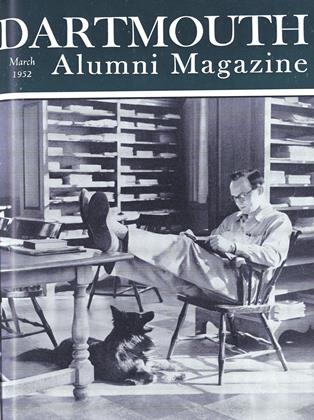The hot-stove football leaguers got something to talk about last month when the presidents of the Ivy League colleges (Brown, Columbia, Cornell, Dartmouth, Harvard, Pennsylvania, Princeton and Yale) announced an agreement which, among other things, abolishes spring football practice and prohibits players and coaches from participating in post-season football games.
The release was distributed simultane- ously by each of the colleges concerned and carried by the major press associa- tions. President Dickey said in a prepared statement:
"The agreement announced today by the eight Ivy group colleges and universities establishing certain basic policies governing intercollegiate football relations within the group seems to me to be a positive approach to the objective of keeping the game of football a healthy influence in the total life and work of these institutions of higher learning."
The abolition of spring practice will, of course, affect the work of the coaches in many ways. A major consideration is that it will prevent them from seeing how their crop of freshmen can fit into the lineups. The eager freshman star will now have to wait almost a full year before he can demonstrate his ability as a varsity candidate. Speaking of the eight points in the presidents' agreement, Coach "Tuss" McLauehry said:
"This is top-level action and it is the duty of the coaches to comply loyally regardless of what their personal feelings may be."
Although Dartmouth has never entered competition after the regular schedule the prohibition of post-season games concerns Tuss directly because, for the last few years, he has coached the East team in the annual East-West game played in Los Angeles.
Director of Athletics William H. McCarter '19 is most directly concerned with the administration of the new regulations. At the time of the release, he said:
"The Presidents of the Ivy Group colleges are the final authority in matters of policy, and their statement speaks for itself. Obviously, the intercollegiate athletic departments of the eight institutions will conform with the dicta of their administrations, and endeavor to adjust their schedules and other operations to avoid any marked inequalities in athletic competition."
The release to the press stated that the presidents of the Ivy League colleges had agreed:
(1) To abolish so-called football clinics, that is, the practice of assembling high school coaches to explain and demonstrate coaching methods of the staff.
(2) To abolish spring football practice because of the peculiar pressures on football and their desire to avoid intensity of athletic specialization in a single sport. In taking this action the Committee recognizes that the same evils may exist in other major sports and they are proceeding with a study of this matter.
(3) To start fall football practice for all institutions on Thursday, September 4, 1952.
(4) That beginning with the fall of 1953, each institution would play every other institution in the group at least once every five years.
(5) To study ways and means of reducing the number of games scheduled.
(6) To reaffirm the principle of the control of athletics by the academic authorities, this control to include scheduling policy, eligibility, the award of scholar- ships and student aid.
(7) To amend the eligibility rule in the present agreement by including the following: "Beginning in 1954 no student shall be eligible whose secondary school education was subsidized or whose post- college education is promised by an individual or group of individuals not closely related to the family as a consideration for his attending the college which he now attends."
(8) To amend the rule in regard to post- season football contests to read as follows: "The subscribing institutions shall not engage in post-season football contests or any contests designed to settle sectional or other championship, and no player representing these institutions shall participate in such contests, and no coach shall under- take to coach teams entered for such contests."
 View Full Issue
View Full Issue
More From This Issue
-
 Article
ArticleAround the World in Fifty Books
March 1952 By JOHN HURD '21 -
 Article
ArticleTelevision and Education
March 1952 By EDWARD LAMB '24 -
 Class Notes
Class Notes1918
March 1952 By ERNEST H. EARLEY, DONALD L. BARR, RICHARD P. WHITE -
 Class Notes
Class Notes1929
March 1952 By F. WILLIAM ANDRES, EDWIN C. CHINLUND, JACK D. GUNTHER -
 Article
ArticleThe Undergraduate Chair
March 1952 By Conrad S. Carstens '52 -
 Class Notes
Class Notes1923
March 1952 By TRUMAN T. METZEL, COLIN C. STEWART 3RD









